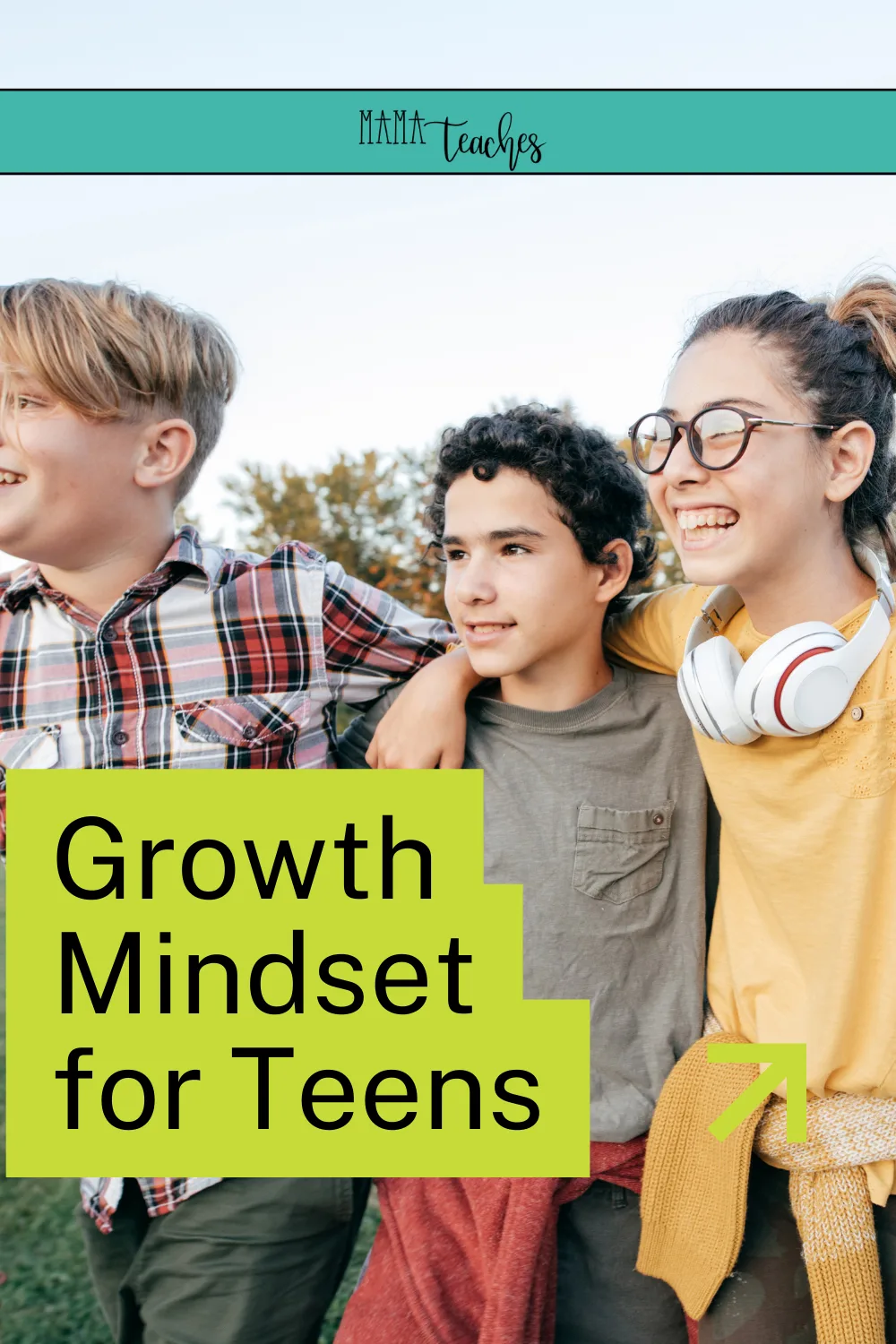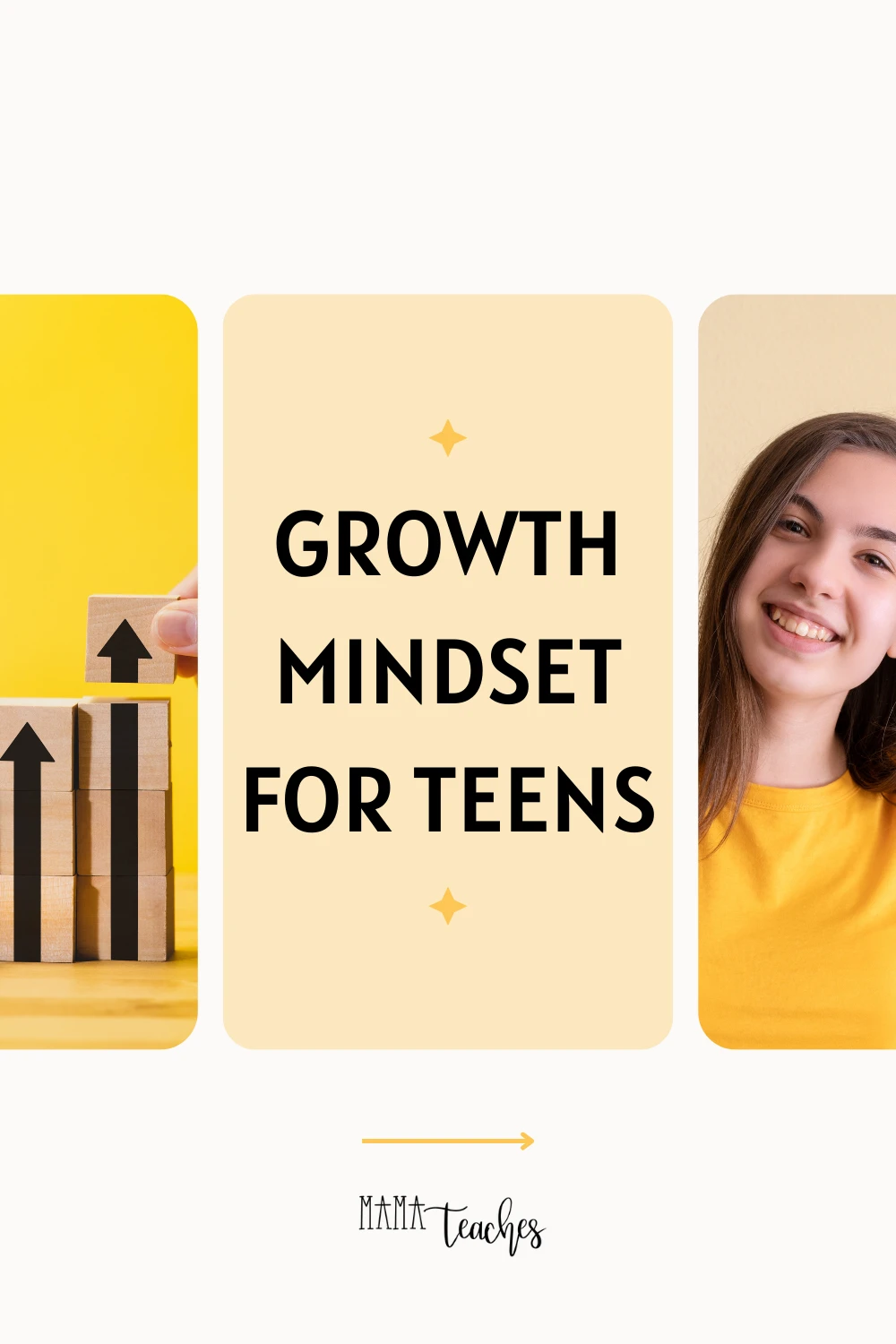You want teens to believe in themselves, set goals, and work to achieve those goals.
All that is possible with a growth mindset.
How do you train a growth mindset for teens? We’ve got answers.

What Is a Growth Mindset?
The growth mindset definition was developed by Dr. Carol Dweck and her colleagues after years of research.
They found a link between belief and success.
If a person holds a growth mindset, they believe that intelligence and success are obtained through hard work.
A growth mindset encourages a person to tackle challenges because, through that experience, they can learn and grow.
By contrast, a fixed mindset is the belief that everyone is born with a certain amount of intelligence or talent.
You either have the capacity to do or learn something, or you don’t. No amount of effort will change anything.
If a person holds a fixed mindset, studies show they are less likely to persevere or try new things.
They will shy away from challenges if they fear they won’t succeed.

To learn more about growth mindset vs fixed mindset, check out this article.
This article contains affiliate links to things that you might like.
Why Growth Mindset Is Important for Teens
Possessing a growth mindset is so important for teens.
Self Image
On the whole, teenagers and self-conscious and unsure. They do not know who they are or what they can do.
If they have a fixed mindset, they may see themselves as “less than” their peers.
This can lead to a negative self-image.
If they have a growth mindset, they believe they can improve themselves over time.
They can make themselves into who they want to be. They can realize their goals.
Teenagers with a growth mindset are more likely to see themselves positively.
Goals
If a teen has a growth mindset, the future is full of possibilities!
They believe they can achieve their goals as long as they take the necessary steps to get there.
They do not shy away from challenges because they believe they can figure out a way to navigate them.
On the other hand, if a teen has a fixed mindset, they will see certain dreams as out of reach.
This will limit their goals. Their attitude toward working hard will be “What’s the point?”

Ways to Encourage the Development of a Growth Mindset in Teens
A growth mindset for teens does not happen overnight.
It needs to be taught and trained. Slowly, positive outcomes will prove to the teen that a growth mindset is correct.
Surround Your Teen with Growth Mindset Quotations
If you listen to sad songs, you will find yourself humming sad songs all day.
If you listen to happy, upbeat music, that will be the soundtrack you play in your mind.
The same is true for words that promote a growth mindset.
You want to provide the right input to your teen; expose him or her to growth mindset quotations.
You can do this by picking a quotation of the day.
You’ll find a list of 50 Growth Mindset Quotes here.
You can also turn growth mindset quotations into art to hang up in your home or classroom.
(Find FREE Growth Mindset posters here.)
You can even print out cheery growth mindset notes to staple to homework.

Develop Some Catchphrases
Everyone has things they always say.
Pick a few of the growth mindset quotations to incorporate into your repertoire.
You could be the person in a teen’s life who encourages them that all things are possible with hard work.
Here are some ideas of catchphrases:
“Everything new takes time to learn.”
“Strive for progress, not perfection.”
“You can train your brain to figure it out.”
Turn Around Expressions
You will often hear teenagers verbalize negative statements that reflect their fixed mindset.
Whenever you hear this, offer them an alternative.
“I’m terrible at math” becomes “I haven’t mastered this math concept yet.”
“I keep making mistakes” becomes “I’m trying and that means I’m learning.”
“I give up” turns into “I should try a different way.”
Tap into the power of the word yet.
They say, “I can’t do this.” You echo, “You can’t do this yet.”

Teach the Brain Science
Growth mindset isn’t wishful thinking–it’s backed up by science!
Teach teens words and definitions like “neuroplasticity.”
Check out this article in Psychology Today.
Be Inspired by Those with a Growth Mindset
Learn the stories of people who have achieved great things due to their growth mindset. Share them with teens!
The following people believed all things were possible, and then they worked hard to see those things happen!
Here are some examples:
- Booker T. Washington
- Helen Keller
- Archimedes
- Martin Luther King, Jr.
- Michaelangelo
- Mother Teresa
- Harriet Tubman
Praise Effort
When we only praise success, we miss the opportunity to praise progress.
Praising effort or progress encourages teens to keep trying.
Praising success can teach teenagers that if they don’t think they can succeed, they are better off not trying at all.
So train yourself to compliment out of the box thinking, perseverance, and creative problem solving.
If a teen tries and fails, they have still learned something!
Failure is the pathway to success (just ask any inventor).

Provide Fun Challenges
Teens need to see for themselves that when they try, they can overcome challenges.
Give them opportunities to accomplish large tasks that are fun and not overwhelming.
Provide only minimal support.
You can do this at home. “Why don’t you make dinner next Saturday?” Then give them the freedom to plan a menu and do the shopping.
You can ask them to design your family Christmas card on a photo site.
In school, you can task small groups with challenges that promote creative problem solving.
Encourage Self-Assesment with a “Glow and Grow”
Teens can often be their own toughest critics.
After an assignment, performance, sports game, projects, etc., ask the teen, “What is one thing you think you did well?”
That is the “glow.”
If the teen is very self-critical, they may have trouble picking even one thing. But press them to think of something.
Remind them that effort is something to celebrate.
Then ask them to pick only one thing to work on for next time.
That is the “grow.”
By asking them to see the good in their work and give themselves a measurable goal for next time, you are training them to have a growth mindset.

The Importance of a Growth Mindset for Teens
Teens are learning about themselves and making decisions about their futures.
This is an all-important time to have a growth mindset!
By training teens to develop a growth mindset, you are helping them realize what is possible.
